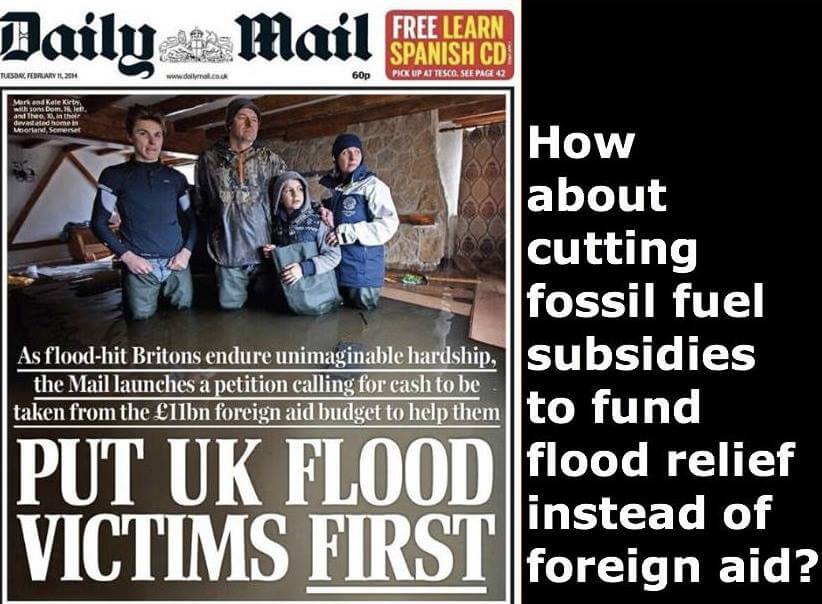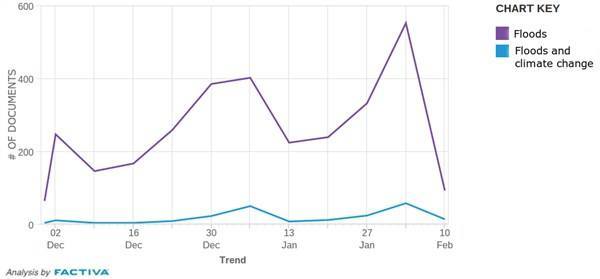 Many people were pretty nauseated by the Daily Mail front cover at the start of this week, promoting a UKIP backed petition calling for David Cameron to scrap the foreign aid budget and to instead use it for the relief of flood victims. Beneath the populist posturing seemed to lie a more sinister intent. As campaign strategist Chris Rose wrote, “Presumably the Mail‘s intention, apart from resonating with the values of its frequent readers, which it does (below), is to drive the Conservative-led UK Government further ‘right’, in fear of UKIP.” (There’s also a really good riposte from Kevin Watkins of the Overseas Development Institute here). It felt important to try and push back on the Mail’s divisiveness, and it also felt there was need to further the efforts to bolster a public discourse linking climate change with the floods. A media analysis from Carbon Brief showed that there had been shockingly little mention of climate change in the media in the context of the unprecedented flooding taking place.
Many people were pretty nauseated by the Daily Mail front cover at the start of this week, promoting a UKIP backed petition calling for David Cameron to scrap the foreign aid budget and to instead use it for the relief of flood victims. Beneath the populist posturing seemed to lie a more sinister intent. As campaign strategist Chris Rose wrote, “Presumably the Mail‘s intention, apart from resonating with the values of its frequent readers, which it does (below), is to drive the Conservative-led UK Government further ‘right’, in fear of UKIP.” (There’s also a really good riposte from Kevin Watkins of the Overseas Development Institute here). It felt important to try and push back on the Mail’s divisiveness, and it also felt there was need to further the efforts to bolster a public discourse linking climate change with the floods. A media analysis from Carbon Brief showed that there had been shockingly little mention of climate change in the media in the context of the unprecedented flooding taking place.

So we were inspired by a tweet by Andrew Simms that said it would be more appropriate to use money from cutting fossil fuel subsidies to provide funds for flood relief rather than foreign aid.
Dear @DailyMailUK, Instead of ditching Aid to pay for flood relief, why not cut the UK’s larger £12 billion fossil fuel subsidies? #climate — Andrew Simms (@AndrewSimms_uk) February 11, 2014
We’ve been doing a fair bit of work on fossil fuel subsidies in the last year. We published a report Making a Killing: Oil Companies, Tax Avoidance and Subsidies and in October last year we gave evidence at a Parliamentary enquiry on the matter. We used 38 Degrees’ petition platform to start a counter petition to the Daily Mail.
The Parliamentary Environmental Audit Committee says that we are spending £12 billion a year on energy subsidies – more than what is spent on Foreign Aid. The vast majority of these subsidies go to the already massively profitable fossil fuel and nuclear industries. In 2012, Shell alone reported profits of £18 billion. These fossil fuel subsidies are widely recognized as being a massive hindrance in dealing effectively with climate change, and climate change is increasing the intensity and frequency of the extreme weather events that have created so much misery in the UK through flooding. Ending fossil fuel subsidies would not only free up money that could be used to assist the victims of flooding, it would also be addressing the conditions that are making the floods so much worse.
There’s been a great response so far. At the time of writing, almost 5000 people have signed it. It’s a long way off the 100,000 plus that signed the Daily Mail’s, but not at all bad considering that we didn’t get to advertise ours twice across the front page of the biggest selling daily newspaper. We were never going to ‘win’ on those terms – what’s important here is giving people an opportunity to articulate an alternative narrative that links the causes of extreme weather with the impacts, and also one that rejects the premise that we should be abandoning UK foreign aid commitments.
Raise money for flood relief by targeting subsidies for rich corporations, not taking aid from the poorest https://t.co/QSXmbtYteM — Katy Chadwick (@KatyChadwick1) February 13, 2014
To counter DailyMail poison w practical alternative, sign this: CUT FOSSIL FUEL SUBSIDIES FOR FLOOD VICTIMS RELIEF https://t.co/Z3XozQ4f7m — Phil England (@ClimateRadio) February 12, 2014
Climate change = warmer, wetter winters for UK = floods. Quit funding the problem to fund response https://t.co/W1malhqiw8 via @38_degrees — Kristina Diprose (@KristinaDiprose) February 11, 2014
The suffering and massive inconvenience caused to communities across the country as a result of the floods is a prime example of how the government’s spending cuts don’t equate to saving money.In the immediate context, it’s astounding the cuts to flood defence budgets were made in the face of advice from experts and it’s right and proper that money should be “no object” in the relief effort. In the bigger picture, eminent economists like Lord Nicholas Stern have shown that our failure to act now on climate change mean paying larger proportions of GDP in future to deal with the consequences of extreme weather events. Phasing out fossil fuel subsidies isn’t controversial – it’s a sensible and essential measure in the transition to a low carbon society, and a measure that’s been endorsed by a whole range of different political bodies, from the G20 to the International Energy Agency. But with Osborne having unveiled “the most generous tax breaks in the world” for fracking companies last year we seem to be heading in the opposite direction. It’s not always easy to reflect all the subtleties of a particular issue in a petition, so here’s a few points that we felt are worthwhile making on the basis of some of the feedback and the comments that we’ve had.
1) This petition is made in solidarity with and in support of the enormous amounts of suffering, inconvenience and fear that communities around the country have undergone as a result of the floods. The Daily Mash spoof article Mail demands foreign aid to be spent on replacing British carpets might raise a laugh at the Mail’s expense, but in doing so belittles and trivialises the very real impact that these floods are having on peoples’ lives and livelihoods. By playing a small part in the wider attempts to bring about meaningful change of government policy on climate change, its also acting in solidarity with those communities that will suffered the increased frequency and intensity of extreme weather in the future.
2) The £12 billion figure on energy subsidies that we have used comes from the findings of the recent Environmental Audit Committee enquiry, that concluded that fossil fuel subsidies are “are inconsistent with the global effort to tackle climate change, providing incentives for greater use of such fuels and disincentives for energy efficiency.”
3) It’s unclear how much of that £12 billion figure is accounted for by a reduced rate VAT on domestic fuel. Our research on tax avoidance by oil and gas companies in Making a Killing suggest that this is a far greater subsidy, not to mention the more “off budget” subsidies in the form of military and diplomatic support that we outlined in the submission we made to the parlimentary enquiry.
4) Regardless of the ratio of reduced VAT on domestic fuel versus other forms of subsidies that benefit producers rather than consumers of energy, it’s worth reiterating that while the entire system needs to be phased out, it needs to be done in such a way that doesn’t exacerbate fuel poverty for energy users over night. The solutions we are in favour of are likely, in the long-run, to reduce fuel poverty, such as energy efficiency, small scale and locally owned renewables etc. We’ve been pleasantly surprised by the extent of the response to the petition – a big thank you to everyone who signed and shared it. As a spur-of-the-moment initiative, we can put our hands up to admit that we’re not entirely sure what happens next. It’s steadily accruing signatures still, so do keep sharing it, and also let us know if you have some suggestions as to how we could maximise its impact when we deliver it.